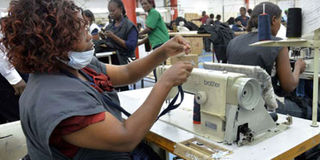EAC officials defy US bid to review Agoa trade deal

Workers at the United Aryan EPZ factory in Nairobi. EAC officials have opposed US bid to review Agoa trade deal over used clothes ban. PHOTO BY SALATON NJAU
Senior officials from Rwanda, Tanzania and Uganda argued in Washington on Thursday that their collective phase-out of used clothing (mitumba) imports should not result in any loss of benefits from a US preferential trade programme.
The representatives of the three East African Community (EAC) countries spoke in opposition to an effort by a US business association to restrict their eligibility for the trade initiative known as the African Growth and Opportunity Act (Agoa).
Smart initiative
The Secondary Materials and Recycled Textiles Association (Smart) filed a petition with US trade authorities in March urging that the three countries, along with fellow EAC member Kenya, be deemed ineligible for Agoa’s allowance of duty-free textile and apparel exports to the US market.
Mr Lawrence Bogard, an attorney representing Smart, warned at Thursday’s US government inquiry that the association’s member companies would suffer major losses in jobs and revenues if the EAC ban on used-clothing imports is fully implemented.
Mr Bogard also argued that Kenya should be included among the EAC countries facing partial loss of their Agoa benefits.
The top US trade agency had announced last month that Kenya would be excused from the group of countries potentially subject to review of their Agoa eligibility.
That decision was said to be based on “recent actions Kenya has taken, including reversing tariff increases, effective July 1, 2017, and committing not to ban imports of used clothing through policy measures that are more trade-restrictive than necessary to protect human health.”
But the Smart representative suggested on Thursday that Kenya ought to be included in the Agoa eligibility review until officials in Nairobi clarify their commitments.
Smart specifically seeks confirmation that Kenya’s reported imposition of minimum tariffs on containers of used goods “will not be implemented in a manner that negates the July 1 roll-back of Kenya’s tariff increases,” Mr Bogard said.
Kenya would have far more to lose from suspension of its duty-free textile export privileges under Agoa than would any of the other EAC countries.
Kenya sold $394 million worth of textiles and clothing on the US market last year, compared to the total $43 million sum of Agoa trade for Rwanda, Tanzania and Uganda.
The Kenyan embassy in Washington says that 66,000 jobs in Kenya are linked to Agoa’s textile-export provisions.
The opposing parties presented their comments to a panel of representatives of six US government agencies: the departments of Commerce, Labour, Treasury and State, as well as the US Agency for International Development and the Office of the US Trade Representative. Kenya was not represented at the hearing.




